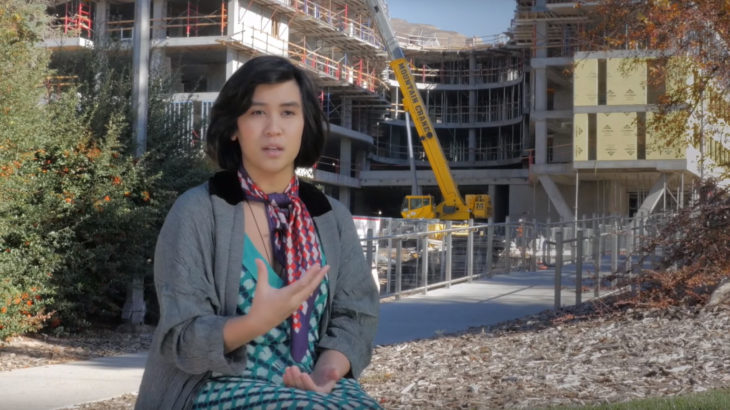As the producer of BIOTA, a science documentary web series focused on educating millennial audiences about creating symbiosis in their world, entrepreneurship is essential. BIOTA started in 2013, when my close friend Sabah Ul-Hasan and I discussed our angst of my having experienced prejudice working as women of color in our fields, for me as a freelance filmmaker in the local Utah entertainment industry and for Sabah as an aspiring Muslim American scientist finishing her graduate education at the University of New Hampshire. Our saving grace of clarity came from a question that I asked her: If you could do anything in the world, without limitation, what would you choose to do? Since then, BIOTA distributed in Valley PBS in the Central Valley, and is currently in full swing production for Season One, with travels booked throughout the 10 bioregions of California.
This question of “If you could do anything” has lead to me accomplish incredible things as an independent filmmaker, and it’s a concept that isn’t particularly new to any college student born out of the Oprah “follow your passion,” Abraham Hicks “Enter the Vortex” philosophical and religious rhetoric (the idea about “the Universe” to string theory). I’ve observed that a more accurate description is that generations before us have suffered to us – as Generation Y – the luxury of focusing on self-actualization, rather than meeting our needs for survival. We’re a generation that doesn’t need to focus on the future of our posterity, but instead choses to live the lives that our parents couldn’t live because of their social expectations and cultural limitations. And as such, programs like the Lassonde Entrepreneurship Institute exist to help inspire the achievement of these goals that blend our personal desires with the needs of the world. This journey of creating impact on campus, within my community, and in my world starts with understanding who I am. And surprisingly, despite being an untraditional college student whose more mature than the average undergraduate, I find myself still in the process of “becoming.”
It’s for that reason that I am pursuing Innovation Scholars. My most profound experience within the “Innovation Roadmap” course. Kathy Hajeb, a director at the Lassonde Entrepreneurship Institute, teaches the course. In it, she guides students in workshops and assignments in discovering the “why” behind the impact that they would like to facilitate on campus.
This process was empowering for me. I’ve worked in the entertainment industry since I was a teenager. I’ve worked for Spike TV and BBC Worldwide. I’ve produced independent feature length films with $155,000 for its budget. But not even I have been able to discover my “why.” If anything, the “Innovation Roadmap” course brought up even more insecurities for me that I needed to face. For instance, I understood more thoroughly through the roadmap course’s required blog assignments that my experiences as a survivor of sexual assault influenced my deep connection to the plights of women. And despite being an artist at heart, I realized in one-on-one discussions with Kathy that I oftentimes turned to business administrative roles half because of fear of the starving artist archetype, and half because I truly wanted to give others access to see their creative visions through to completion.
It’s been half a year since taking the “Innovation Roadmap” course, and I’m still unearthing my path as an undergraduate Innovation Scholar. I’ve since then connected to a mentor, artist Stephen Goldsmith, director of Undergraduate Studies, who has taught me this: More than seeking to impact from a place of external influence, I’m finding and innovating myself. He’s assigned me books like “The Unknown Craftsman: A Japanese Insight into Beauty” to critical discussions like Pope Francis’ Laudto Si’ (“He’s a scientist disguised as a pope!” Stephen told me), and anthropological studies such as “The Traditional Artist in African Societies” to help me build not only my critical thinking muscles, but provide a broader historical context to the idea of what it means to be an artist. The readings so far have informed my worldview as an aspiring catalyzer of perception shifting, and creator of new ways to interact with reality. (Is this not the Innovation Scholar’s larger intent? To impact their world?) I’m looking forward to discussing with Kathy Hajeb soon about my insights, and how this further informs my Innovation Roadmap as I continue my education at the University of Utah.
I still produce BIOTA. (It’s a large part of my service as a Community Engaged Scholar with the Bennion Community Service Center). And I still help people film their Kickstarter videos to general business marketing, and work at the Salt Lake Film Society (a leading non-profit in town responsible for anchoring art culture our Salt Lake community). But what I find fascinating about being an Innovation Scholar is how this concept of “innovation” needs to be seen as an internal process as well as an external process of creating and interacting with our world and others.
Business – at its core – is about relationships. And the businesses that we create are ultimately reflections of ourselves. If we are clear about our intentions, then we can be the most effective results-oriented leaders that we are as Innovation Scholars. But being effective requires understanding the “why” behind what we do. And the only way to reach to this “why” is to understand the histories that lead us to our decisions now so that we can be more conscientious about the decisions that we make in our future.
I’m constantly in the process of rediscovering myself, and redefining and refining what’s most important to focus on. I’m confident that this will make me a healthy person, and an entrepreneur, artist, and innovator with much to offer in the future. I hope that you’ll also take the time to discover the “why” behind what you do, because the world needs your well-informed, disciplined impact.



